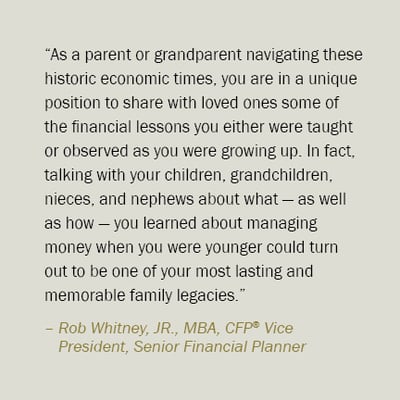4 min read
Financial Advice for Your Family's Young Investors
 Robert E. Whitney, Jr., CFP®,
:
Jul 21, 2022 11:00:00 AM
Robert E. Whitney, Jr., CFP®,
:
Jul 21, 2022 11:00:00 AM

No matter how old you are, there’s a good chance many of the life and financial lessons that stayed with you as you grew up were taught by members of your family. In fact, it’s a common belief parents are the single most powerful influence in their children’s long-term financial lives. What your parents taught you about money when you were younger likely had a profound effect on your financial habits today.
But what if you lived and grew up in a house where those “financial conversations” didn’t happen? For example, people who were born before 1945 didn’t openly talk about money matters—they were part of the “Silent Generation.” As a rule, what they earned and how they spent their money were kept very close to the vest. Many from the Silent Generation followed the same behaviors they learned and observed from their parents — actions speak louder than words.
Getting Young Family Members on Track to Achieve Financial Goals
Younger family members are at very different stages in their financial journeys: saving for a special toy, earning an allowance, working at an after-school job, graduating from college, embarking on a career, getting married, buying a home, starting a family, or already saving for retirement. But they all have one thing in common — they are eager to take control of their own money.

With that in mind, here are some suggestions to get the children and young adults in your family on track with their finances to achieve their future goals and dreams — however far out that horizon may be. Encourage them to:
Talk with a financial advisor at the appropriate time. Young children will fondly remember and practice the important basic life lessons you teach them. But when they grow older, and the timing is right, transfer their focus to seeking out a professional advisor who will accompany them on their financial journey and provide investment guidance in their best interest at every stage of their life. They should build an open, trusting relationship with this individual and feel comfortable enough to ask questions about anything — especially in stressful times. An objective advisor can help them avoid mistakes and bring a candid, unbiased perspective to a volatile or game-changing life event when you or other family mentors are no longer there to do so.
Determine a path early. Remind even very young members in your family that it’s never too early to think about what they want in life and plan how they’re going to get it. Encourage older children and young adults to outline one-year, five-year, and ten-year goals for what they want to achieve personally, professionally, and financially. They should consider posting their goals where they can see them and revisit them on a regular basis.
Identify and organize financial assets. Before a young adult can formalize a plan for the future, he or she must identify all financial assets (i.e., salary, savings, investments, retirement plans, bank accounts, cash, insurance policies, trust funds, inheritances, personal and real estate property, fine art and collectibles, etc.). Once assets have been identified, suggest they document the information in the event an illness, job loss, divorce, or death occurs.
Make saving a priority. For generations, introducing small children to the concept of money and the value of saving is what parents, grandparents, aunts, and uncles have been doing with piggy banks, big jars, and savings accounts. Gifts and money earned are divided into three parts: the first for spending, the second for saving, and the third for sharing with others. It’s a practice many individuals carry on throughout their lives, all the way up to and through retirement — and it’s never too early or too late to start.
Encourage the young adults in your family to establish a budget — setting aside funds in a separate savings account should be at the top of the list. Budgeting the rest of their expenses will help them become disciplined enough to live within their means. If these troubled times have taught us anything, it’s the importance of having an emergency fund to fall back on. The general rule of thumb is to save three to six months of living expenses in an interest-bearing bank account. Also, suggest those who are working participate in their employer’s retirement plan, especially if the employer matches all or part of their contribution.
Weigh employment options. Those closer to the end of their career versus just starting out understand the many steps, obstacles, and detours between landing that first job and eventually retiring. Recent graduates may find it hard to imagine ever doing anything other than what they trained for in college. New parents may be wrestling with the challenges of having careers and raising a family. Young adults may find it extremely difficult to start over after an economic recession or sudden job loss. You’ve seen it all in your lifetime — your love, support, and guidance can help your family members work through hard times, tackle challenges, and strive to reach their potential.
Establish and maintain solid credit. The sooner young adults do this the better. Help them understand the rates and terms of the loans they take out (i.e., student, mortgage, auto, and credit cards). The ramifications of bad credit are significant — and they can follow a person for years. Talk about the importance of making timely payments and regularly checking their credit score at annualcreditreport.com.
Weigh health, life and disability insurance options. For basic insurance options for young adult family members, recommend they consult with their employer’s human resources department. Employment specialists can advise them on the specific benefit choices and costs for health, life, and disability insurance needs. If specialized coverage is required (i.e., liability insurance to protect business interests or disability coverage for higher paying careers) suggest contacting a private agent.
The importance of advice
With the proper guidance, the children and young adults in your family can grow into financially responsible adults. They will learn how a capable, knowledgeable advisor can help them build a team of professional specialists who will not only help them identify their goals, create a plan, and manage their money, but also empower them to make educated financial decisions for all aspects of their lives based on their unique personal and financial circumstances.
From learning about asset allocation, risk tolerance, and diversification in their first investment portfolio to working with their estate planning attorney to ensure their final wishes are honored, each young family member should include an objective financial advisor as an integral partner in their financial journey. Contact Commerce Trust today to learn more about how we can help with these important conversations with the future generations of your family.
The opinions and other information in the commentary are provided as of July 21, 2022. This summary is intended to provide general information only, and may be of value to the reader and audience.
This material is not a recommendation of any particular investment or insurance strategy, is not based on any particular financial situation or need, and is not intended to replace the advice of a qualified tax advisor or investment professional. Commerce does not provide tax advice or legal advice to customers. Consult a tax specialist regarding tax implications related to any product and specific financial situation. While Commerce may provide information or express opinions from time to time, such information or opinions are subject to change, are not offered as professional tax, insurance or legal advice, and may not be relied on as such.
Data contained herein from third-party providers is obtained from what are considered reliable sources. However, its accuracy, completeness or reliability cannot be guaranteed.
Commerce Trust is a division of Commerce Bank.
Not FDIC Insured / May Lose Value / No Bank Guarantee
Getting Young Family Members on Track to Achieve Financial Goals
Younger family members are at very different stages in their financial journeys: saving for a special toy, earning an allowance, working at an after-school job, graduating from college, embarking on a career, getting married, buying a home, starting a family, or already saving for retirement. But they all have one thing in common — they are eager to take control of their own money.

With that in mind, here are some suggestions to get the children and young adults in your family on track with their finances to achieve their future goals and dreams — however far out that horizon may be. Encourage them to:
Talk with a financial advisor at the appropriate time. Young children will fondly remember and practice the important basic life lessons you teach them. But when they grow older, and the timing is right, transfer their focus to seeking out a professional advisor who will accompany them on their financial journey and provide investment guidance in their best interest at every stage of their life. They should build an open, trusting relationship with this individual and feel comfortable enough to ask questions about anything — especially in stressful times. An objective advisor can help them avoid mistakes and bring a candid, unbiased perspective to a volatile or game-changing life event when you or other family mentors are no longer there to do so.
Determine a path early. Remind even very young members in your family that it’s never too early to think about what they want in life and plan how they’re going to get it. Encourage older children and young adults to outline one-year, five-year, and ten-year goals for what they want to achieve personally, professionally, and financially. They should consider posting their goals where they can see them and revisit them on a regular basis.
Identify and organize financial assets. Before a young adult can formalize a plan for the future, he or she must identify all financial assets (i.e., salary, savings, investments, retirement plans, bank accounts, cash, insurance policies, trust funds, inheritances, personal and real estate property, fine art and collectibles, etc.). Once assets have been identified, suggest they document the information in the event an illness, job loss, divorce, or death occurs.
Make saving a priority. For generations, introducing small children to the concept of money and the value of saving is what parents, grandparents, aunts, and uncles have been doing with piggy banks, big jars, and savings accounts. Gifts and money earned are divided into three parts: the first for spending, the second for saving, and the third for sharing with others. It’s a practice many individuals carry on throughout their lives, all the way up to and through retirement — and it’s never too early or too late to start.
Encourage the young adults in your family to establish a budget — setting aside funds in a separate savings account should be at the top of the list. Budgeting the rest of their expenses will help them become disciplined enough to live within their means. If these troubled times have taught us anything, it’s the importance of having an emergency fund to fall back on. The general rule of thumb is to save three to six months of living expenses in an interest-bearing bank account. Also, suggest those who are working participate in their employer’s retirement plan, especially if the employer matches all or part of their contribution.
Weigh employment options. Those closer to the end of their career versus just starting out understand the many steps, obstacles, and detours between landing that first job and eventually retiring. Recent graduates may find it hard to imagine ever doing anything other than what they trained for in college. New parents may be wrestling with the challenges of having careers and raising a family. Young adults may find it extremely difficult to start over after an economic recession or sudden job loss. You’ve seen it all in your lifetime — your love, support, and guidance can help your family members work through hard times, tackle challenges, and strive to reach their potential.
Establish and maintain solid credit. The sooner young adults do this the better. Help them understand the rates and terms of the loans they take out (i.e., student, mortgage, auto, and credit cards). The ramifications of bad credit are significant — and they can follow a person for years. Talk about the importance of making timely payments and regularly checking their credit score at annualcreditreport.com.
Weigh health, life and disability insurance options. For basic insurance options for young adult family members, recommend they consult with their employer’s human resources department. Employment specialists can advise them on the specific benefit choices and costs for health, life, and disability insurance needs. If specialized coverage is required (i.e., liability insurance to protect business interests or disability coverage for higher paying careers) suggest contacting a private agent.
The importance of advice
With the proper guidance, the children and young adults in your family can grow into financially responsible adults. They will learn how a capable, knowledgeable advisor can help them build a team of professional specialists who will not only help them identify their goals, create a plan, and manage their money, but also empower them to make educated financial decisions for all aspects of their lives based on their unique personal and financial circumstances.
From learning about asset allocation, risk tolerance, and diversification in their first investment portfolio to working with their estate planning attorney to ensure their final wishes are honored, each young family member should include an objective financial advisor as an integral partner in their financial journey. Contact Commerce Trust today to learn more about how we can help with these important conversations with the future generations of your family.
The opinions and other information in the commentary are provided as of July 21, 2022. This summary is intended to provide general information only, and may be of value to the reader and audience.
This material is not a recommendation of any particular investment or insurance strategy, is not based on any particular financial situation or need, and is not intended to replace the advice of a qualified tax advisor or investment professional. Commerce does not provide tax advice or legal advice to customers. Consult a tax specialist regarding tax implications related to any product and specific financial situation. While Commerce may provide information or express opinions from time to time, such information or opinions are subject to change, are not offered as professional tax, insurance or legal advice, and may not be relied on as such.
Data contained herein from third-party providers is obtained from what are considered reliable sources. However, its accuracy, completeness or reliability cannot be guaranteed.
Commerce Trust is a division of Commerce Bank.
Not FDIC Insured / May Lose Value / No Bank Guarantee
